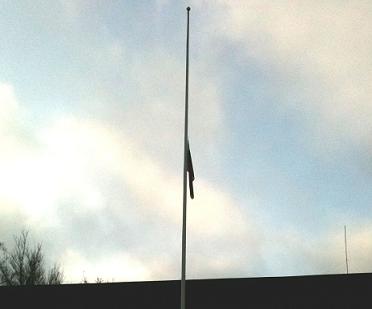А теперь: Russia from the Outside! Posted by josefina on Dec 7, 2009 in News
«План мой был таков:» [My plan was like this:] to write at least one post before «я уехала из России» [I left Russia] on Friday morning, but this plan proved impossible to carry out during my «последняя неделя в России» [last week in Russia]. During my last week at Ural State University I had to make a try at passing as many «зачёты» as I could (plural from the word «зачёт» meaning [‘credit’], but here it is used the context of classes for which there are only two possible grades you can receive: «зачтено» [‘passed’] or «незачтено» [‘not passed’]. This word comes from the verb «зачесть» [‘to consider something done’, ‘to give credit for something’]). This had to be done already now «в декабре» [in December] because I will return to Russia only «в январе» [in January] and by then the fall semester will be long gone. I tried hard but failed at being completely successful in this – «я сдала только три из пяти зачётов» [I only received three out of five credits]. But I say as the Russians would: «Ладно!» [all right, okay, fine, good; fair enough!]. My last week in the country coincided with my first week after recovering from sickness, thus involved seeing «большое количество друзей» [a large quantity of friends] as well as consuming «большое количество питья» [a large quantity of drinks, quencher, beverages] – yes, occasionally people in Russia (and not merely Russians!) drink. In other words, during my last week «я была занята важными делами» [I was busy/occupied with important things] and incapable to get around to blogging about grammar (this said doesn’t mean I don’t have lots of ideas for such posts!).

I took this picture «в подъезде» [porch; entrance; driveway, access; approach – here used in the context of ‘main staircase’] while visiting my friend the week before leaving. I asked her in concern: «Вы получаете почту?» [Do you (plural) get mail?]. She answered with a smile: «Наверно, не всё…» [Most likely not all…].
Yesterday I woke up – «в Швеции» [in Sweden], mind you – and thought to myself: «Написать бы мне пост про какую-нибудь новость из России сегодня!» [Why not write a post about some kind of news story from Russia today!] Already last week did I start thinking about writing a few words here about this interesting piece of news from Saint Petersburg: «В Санкт-Петербурге открылся тематический отель по Ф. Достоевскому» [In Saint Petersburg a Dostoevsky-themed hotel has opened]. But as I was browsing through Russian news sites on Sunday morning, I came across another news story that touched me to tears both because is it a great tragedy, but also it hit close to home for me (I have lived so many years «на Урале» [in the Urals] now that I consider it home): «Пожар в ночном клубе в Перми: 112 (сто двенадцать) погибших, более 130 (ста тридцати) раненых» [A fire in a night club in Perm: 112 lost, more than 130 wounded]. This is an indeed a very «печальное происшествие» [grievous incident] and my heart goes out to all the people in the city of Perm who lost family members and friends this Saturday night. However, I was both relieved and glad when I saw how fast and firm high officials in the Russian government reacted to this terrible accident. Almost straight away you could read that «Президент объявил 7 (седьмого) декабря днём траура» [The president declared the 7th of December a national day of mourning].
«траур» – [mourning; sables].
«день траура» – [national day of mourning].
Today I woke up – «всё ещё в Швеции» [still in Sweden] – and looked out my window to see the Russian flag outside «консульство Российской федерации в Гётеборге» [the Russian Federation’s consulate in Gothenburg] looking like this:

«Даже в Швеции я живу в двух шагах от русской территории!» [Even in Sweden I live ‘two steps’ away from Russian territory!]. I’m sorry that it is almost impossible to make out the tricolor on this photograph, but I am not to blame for «недостаток ветра» [the lack of wind] that occurred today…

Build vocabulary, practice pronunciation, and more with Transparent Language Online. Available anytime, anywhere, on any device.




Comments:
Fëanor:
Hiya. Excellent stuff you’ve got here. I lived in Russia as a kid years ago and have many fond memories of my time there (and some Russian, albeit with a notably shrunk vocabulary!). Hope you’ve entirely recovered from your illness!
serge:
Hi!
I cannot find appropriate words to express the feeling I have towards your blog.
It should be used and shared in every school where Russian language is studied.
Since I was trained in translation Russian, English, French (my monther tongue)
over 25 years ago, and that unfortunately hardly ever practised Russian
(except maybe for my traval in Petersburg last year), I love reading your posts with outmost interest.
Mind you, I advertise it to everyone I would know who studies Russian (very few people unfortunately).
So…keep it up! not only clever, extremely well documented, but also with some fun.
Best regards,
Serge from Brussels
sergemakcheeff@gmail.com
Saint Facetious:
Wait, so “траур” also means “sables”? So the “National Day of Mourning” is also the “National Day of Sables”?
I have a question… and you may have covered this before and I missed it, but… when do you use “теперь” and when do you use “сейчас”? I keep hearing теперь, but when I use it, people always correct me! Что блин!
felina:
1)
(А) теперь = (A) сейчас = And now (a discourse marker, used to signal that the speaker is going to start a new subject)
Examples:
…А теперь /A сейчас поговорим о … (And now we’re going to talk about…)
…А теперь/ A сейчас давайте посмотрим на…… (And now let’s look at …)
Here сейчас = теперь are absolutely interchangeable.
2
сейчас vs теперь
сейчас ~ (right) now (shorter period)
теперь ~ these days (longer period)
…Сейчас он живет в Америке. He lives/is living in America now (and he’s going to move to France.)
…Теперь он живет в Америке. He lives in America now (but he used to live somewhere else before).
«Сейчас» and «теперь» are both “now”, but сейчас is a neutral way of saying now, just time indication which occasionally~ can imply future changes (=Сейчас я живу в России, но I am about to leave for some other place), while «теперь» is usually used to oppose something in the past that is no longer true, as in
Раньше я ел рыбу, теперь я вегетерианец.
В детстве я любила детективы, теперь люблю классику.
Besides теперь embraces a longer period of time.
3
«Сейчас!» by itself can mean “just a minute!”; you can’t use «теперь» in that context.
Подойди к телефону! – Сейчас!
Сейчас приду!
Сейчас сделаю!
Saint Facetious:
Felina, thanks for the help on that one.